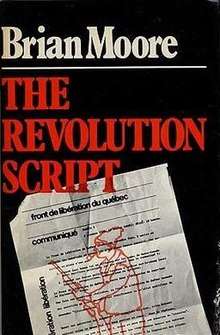The Revolution Script
The Revolution Script is a fictionalised account by Northern Irish-Canadian novelist Brian Moore of key events in Quebec's October Crisis – the kidnapping by the Quebec Liberation Front of James Cross,[1] the Senior British Trade Commissioner in Montreal, on October 5, 1970[2] and the murder, a few days later, of Pierre Laporte, Minister of Labour in the Quebec provincial government. It was published in Canada and the United States at the end of 1971. The British newspaper The Sunday Times reproduced excerpts from the book[3] and it was published in the United Kingdom in January 1972.
 First edition | |
| Author | Brian Moore |
|---|---|
| Country | Canada |
| Language | English |
| Subject | Quebec's October Crisis in 1970 |
| Genre | Historical novel |
| Publisher | New York: Holt, Rinehart and Winston; Toronto: McClelland and Stewart; London: Jonathan Cape |
Publication date | 1971 (Canada and USA); 1972 (UK) |
| Pages | 261 |
| ISBN | 0030867436 |
| Preceded by | Fergus (1970) |
| Followed by | Catholics (1972) |
Reception and criticism
According to Sandra Martin of Toronto's The Globe and Mail, The Revolution Script can be seen as a "Truman Capote-style novel".[4] Ian McGillis, for the Montreal Gazette, described it as "a kind of docu-novel that places the reader in the middle of the October Crisis with an immediacy that makes it feel like this morning’s news".[5]
Kirkus Reviews felt that Moore's attempt to "make the characters less than 'faceless'" fell short but praised his portrayal of the "foolhardy, insurgent enterprise"'s "catalytic tension and instantaneity".[6]
George Woodcock said: "When he is describing settings... he writes vividly and evocatively. When he reconstructs action, he is almost invariably convincing. The coating of verisimilitude, however, begins to wear thin when he tries to create dialogue between the terrorists. The Revolution Script reads then as if it were written, not by Brian Moore the novelist, but by some rather clumsy imitator of Roch Carrier, and the terrorists shape themselves in our minds as incredibly ignorant, naïf and pathetic, which I am sure is not Moore's intention".[7]
Jeanne Flood said that it was "the most flawed and disturbing of all Moore's books" and described its "explicit concern with media" as "nothing less than obsessive". She criticised as "unethical" Moore's "projection of the deeply personal onto public events involving real persons" and argued that the subject matter of the book "demands the scrupulous impersonality of the journalist, not the private emotional energies of the novelist".[8]
However, Moore's biographer, Patricia Craig, described it as "a compact thriller, a perfectly creditable and engrossing reconstruction of a striking sequence of events".[9]
Legacy
An untitled film script, based on his novel and dated July 1972, is held in Moore's archives at The Harry Ransom Humanities Research Center, at the University of Texas at Austin.[10]
References
- Lynch, Gerald (December 16, 2013). "Moore, Brian". The Canadian Encyclopaedia. Retrieved August 7, 2015.
- "The October Crisis". HISTOR!CA. Historica Foundation of Canada. Retrieved June 30, 2015.
- Craig, Patricia (2002). Brian Moore: A Biography. London: Bloomsbury Publishing. pp. 209, 288. ISBN 0747 56004 8.
- Martin, Sandra (March 20, 2009). "Separatist sagas". The Globe and Mail. Toronto. Retrieved April 19, 2015.
- McGillis, Ian (March 23, 2012). "CBC Radio One's Ten Essential Books: where Lucy Maud Montgomery meets the Rhinoceros Party". Montreal Gazette. Retrieved August 28, 2012.
- "The Revolution Script by Brian Moore". Kirkus Reviews. November 15, 1971. Retrieved February 22, 2015.
- Woodcock, George (Winter 1972). "Canada's October Days". Canadian Literature: 74.
- Flood, Jeanne (1974). Brian Moore. Lewisburg, Pennsylvania: Bucknell University Press. pp. 89–92. ISBN 978-0-8387-7972-9.
- Craig, Patricia (2002). Brian Moore: A Biography. London: Bloomsbury Publishing. pp. 213. ISBN 0747 56004 8.
- "Box 20". Brian Moore: A Preliminary Inventory of His Papers. Harry Ransom Humanities Research Center, University of Texas at Austin. Retrieved February 22, 2015.
External links
- Leahy, David (1988). "History: Its contradiction and absence in Brian Moore's The Revolution Script and Black Robe". World Literature Written in English. 282 (2): 298–317. doi:10.1080/17449858808589067.
- Koy, Christopher (2015). "Representations of the Québécois in Brian Moore's Novels". Considering Identity: Views on Canadian Literature and History. pp. 141–156 – via academia.edu.